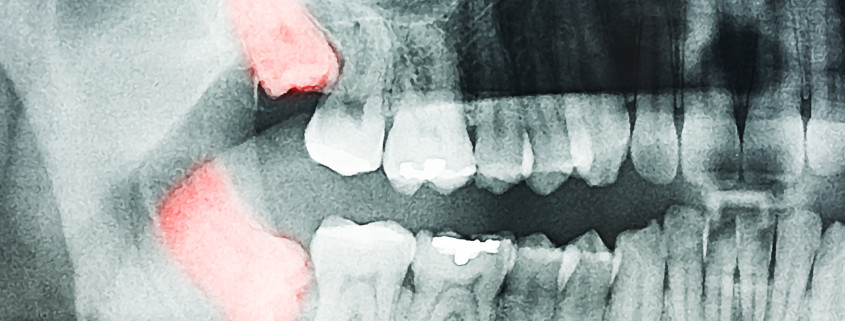The Hidden Cause of Chaos in Your Mouth
Wisdom teeth used to be really helpful. When our ancestors ate rough food that wore down their teeth faster they needed that extra set of molars as replacements.
But with modern oral hygiene (You are getting regular check-ups, right?) and softer diets we’re able to keep our teeth longer. Which means we don’t need those extra teeth. And yet most of us still get them. And this is why chaos begins; 32 teeth don’t fit in a space meant for 28.
Occasionally there is room for those extra teeth and they are able to erupt into the proper position. But, since they are the furthest back in your mouth they are also the most difficult to properly clean, resulting in more cavities.
If there isn’t enough room for them though they will remain trapped in your jawbone. This usually results in your teeth becoming impacted as the wisdom teeth strive to find a way out. Whether your wisdom teeth are partially erupted or fully hidden they can cause a variety of problems for you. The gums around the wisdom teeth are still susceptible to infections and the space around those hidden teeth are especially vulnerable. The pressure from teeth trying to erupt can cause pain in your jaw and the constant force can cause the destruction of neighboring teeth.
Some symptoms of Impacted Wisdom Teeth are
- Jaw pain – Pain in the back of your jaw, or headaches that stem from the area where your jaw meets your skull are the most common indicator.
- Difficulty opening your mouth – those extra teeth crowding the space make it hard for the joints to move easily.
- Pain while chewing – if the gums in the back of your mouth are more sensitive it could be because your wisdom teeth are coming in.
- Bad taste or bad breath – That funk could be caused by an infection or developing cyst.
- Sore or bleeding gums – tender, swollen, or bleeding gums are all signs of gum disease. It can also be cause by the added pressure of the impacted teeth on your gums. If this is occurring where your wisdom teeth would be it might be time to have them removed.
- Changes in your mouth – if your jaw looks swollen and is tender to touch or you feel your teeth being pushed closer together it’s time to call your dentist.
- Swollen glands – if your lymph glands are swollen but you can’t find another source of infection then there might be one hidden in your jaw.
- No Wisdom Teeth appearing – Patients are typically between 16 and 26 when their wisdom teeth erupt. If this hasn’t happened it could be because they’re impacted. It’s important to see your dentist to verify if they’re there or you got lucky and didn’t get any at all.
If you’re experiencing any of these symptoms and you haven’t had you Wisdom Teeth make an appointment to see your dentist as soon as possible. If those extra teeth are causing you problems then the sooner we catch it, the easier it is to resolve.

